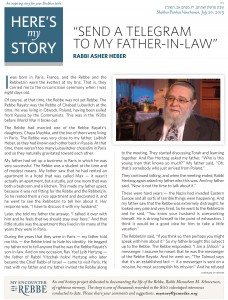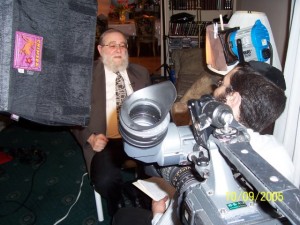HMS: “Send a telegram to my father-in-law”
I was born in Paris, France, and the Rebbe and the Rebbetzin were the kvatters at my bris. That is, they carried me to the circumcision ceremony when I was eight days old.
Of course, at that time, the Rebbe was not yet Rebbe. The Rebbe Rayatz was the Rebbe of Chabad Lubavitch at the time. He was living in Otwock, Poland, having been exiled from Russia by the Communists. This was in the 1930s before World War II broke out.
The Rebbe had married one of the Rebbe Rayatz’s daughters, Chaya Mushka, and the two of them were living in Paris. The Rebbe was very close to my father, Laibish Heber, as they had known each other back in Russia. At that time, there weren’t too many Lubavitcher chassidim in Paris and so they naturally gravitated toward each other.
My father had set up a business in Paris in which he was very successful. The Rebbe was a student at the time and of modest means. My father saw that he had rented an apartment in a hotel that was called Max – it wasn’t actually an apartment, but a studio, just one room that was both a bedroom and a kitchen. This made my father upset, because it was not fitting for the Rebbe and the Rebbetzin. So he rented them a nice apartment and decorated it, and he went to see the Rebbetzin to tell her about it. Her response was, “I have to discuss it with my husband.”
Later, she told my father the answer, “I talked it over with him and he feels that we should stay over here.” And that little studio was the apartment they lived in for many of the years they were in Paris.During the years that they were in Paris – my father told me this – the Rebbe tried to hide his identity. He begged my father not to tell anyone that he was the Rebbe Rayatz’s son-in-law. And on one occasion, Rav Yoel Leib Hertzog – the father of Rabbi Yitzchak halevi Hertzog who later became the Chief Rabbi of Israel – came to visit Paris. He met with my father and my father invited the Rebbe along to the meeting. They started discussing Torah and learning together. And Rav Hertzog asked my father, “Who is this young man that knows so much?” My father said, “Oh, that’s somebody who just arrived from Poland.”
They continued talking, and when the meeting ended, Rabbi Hertzog again asked my father who this was. And my father said, “Now is not the time to talk about it.”
These were hard years – the Nazis had invaded Eastern Europe and all sorts of terrible things were happening. And my father saw that the Rebbe was extremely distraught; he looked very pale and very tired. So he went to the Rebbetzin and he said, “You know your husband is overworking himself. He is driving himself to the point of exhaustion. I think it would be a good idea for him to take a little vacation.”
The Rebbetzin said, “If you think so, then perhaps you might speak with him about it.” So my father brought this subject up to the Rebbe. The Rebbe responded, “I am a Shliach,” a messenger. I assume he meant that he was the messenger of the Rebbe Rayatz. And he went on, “The Talmud says that it’s an established fact – if a messenger is sent on a mission, he must accomplish his mission.” And he refused to take a vacation. This carried over when he left France and came to the United States, where he never took a day off. He knew no such thing as a day off.
Meanwhile, it was apparent that the Nazis might soon invade France, and my father was very undecided as to whether he should leave Paris. He had established a good business, and he was making a lot of money. And he had to make a choice: to remain in Paris or emigrate to the United States along with the entire family.
And, as usual, whenever he had a problem and didn’t know what to do he went to the Rebbe and he asked the Rebbe’s opinion.
The Rebbe said, “You are a chosid. Send a letter or a telegram to my father-in-law.” So my father said, “But there’s a war going on now! No letters are crossing the border, and I doubt there are any telegrams or telephone calls that can be made.”
“As a chosid,” the Rebbe continued, “you should know that the Rebbe does not necessarily have to receive a telegraph or a letter or a telephone call to know the question that you are asking, and you don’t necessarily have to receive a telegraph or a letter or a telephone call from the Rebbe to know what the answer is.”
Hearing that, my father went down to the local Western Union office and he announced that he wanted to send a telegram to Otwock, a town near Warsaw where the Rebbe Rayatz was residing.
The agent sitting behind the desk started laughing. He said, “Are you crazy? You can’t do that! It’s impossible! There’s a war going on. There’s no communication between Poland and France.”
But my father insisted. The agent looked askance at my father, as if to say: “If you’re crazy enough and you want to try, we’ll attempt it.” So my father formulated the letter, and he said, “This is what I want you to send.”
As he awaited the answer, he continued to be very much in doubt whether he should go to a strange country and start all over again. Here he was established and successful. He really preferred to remain in Paris.
The next morning he woke up with a clarity – even though the day before he had been completely in doubt, completely in the dark, as to what to do – he woke up with the clear realization and with no doubt in his mind whatsoever that the family must leave Paris and go the United States. And that’s exactly what we did. Our lives were saved because of it.
Rabbi Asher Heber is a lifelong educator. Presently he teaches at Yeshivas Ohr Torah in Manhattan. He was interviewed in his home in Brooklyn, NY in October, 2005.
This week’s Here’s My Story is dedicated








No Comments to “HMS: “Send a telegram to my father-in-law””